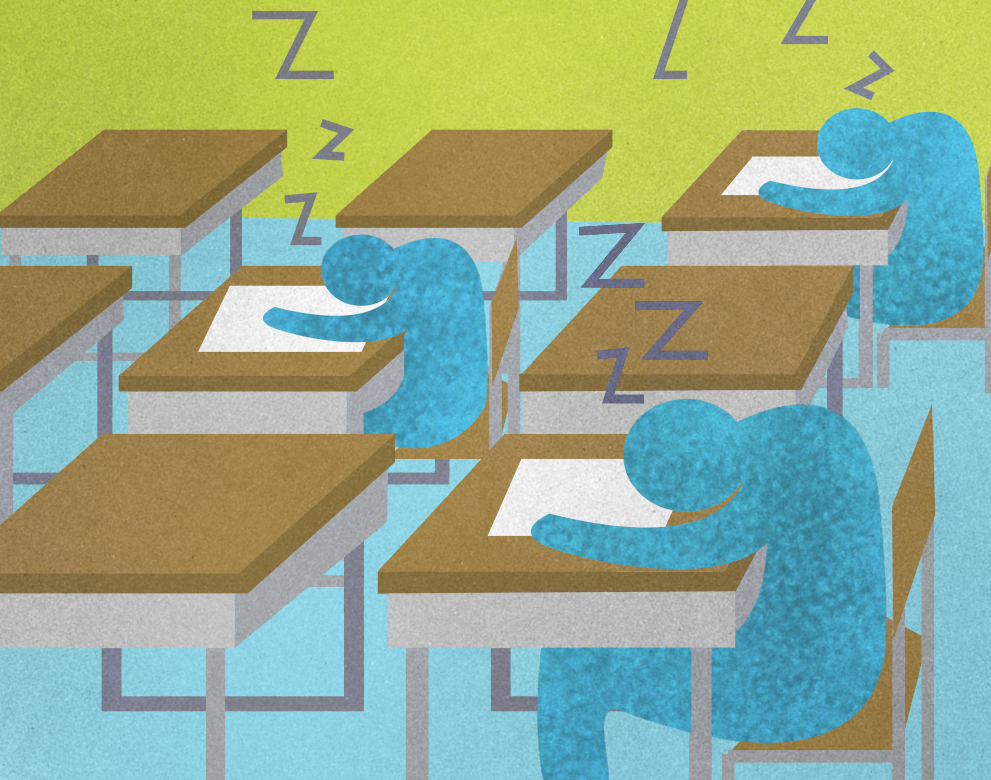
Exam schedule flexibility important for students
June 14, 2017 —
Could you write a final exam 17 hours after your last class? That’s what Shaiel Ben-Ephraim’s HIST 397.02 class is tasked with this semester. His last class ends at 2:45 p.m. on June 28. Students write their exam at 8:00 a.m. the next morning.
Seventeen hours isn’t very much time to prepare for an exam, and in practical terms, it’s much less than that. Research shows that students perform best when they’ve had eight hours of sleep before their exam. When you add in the time it takes to eat and get to and from campus, students only have about eight hours to review a semester’s worth of information.
It’s a stressful situation that could take a toll on students’ mental health. Problems like test anxiety are exacerbated under a tight timeline. Unfortunately, it’s a problem that the registrar’s office — the department that schedules exams — has done little to remedy, despite continued requests from Ben-Ephraim and students in the course.
When asked about Ben-Ephraim’s class, the registrar’s office declined to comment. But in the more general case of exam rescheduling, registrar Angelique Saweczko cited logistical headaches as a limiting factor in the University of Calgary’s ability to change exams.
“The spring exam schedule will have over 10,000 exams administered for 150 courses. To change one course could increase direct conflicts and back to back exams for many students,” Saweczko said. “The Registrars’ Office makes the best effort to create a schedule that best fits all students and exams fully.”
Of course it’s difficult to reschedule exams. The spring exam period is only three-days long and there’s a lot of exams to conduct during that stretch. Moving one exam can create a domino effect of conflicts and complications.
But that doesn’t mean students should suffer because of those difficulties. One of the central tasks of the registrar’s office is scheduling and facilitating exams. In the words of Ben-Ephraim, “There’s an entire office in the university whose job is to facilitate this and right now they’re not doing their job.”
A recent precedent for moving a scheduled exam at the U of C was the 2013 Calgary floods. While that was clearly a situation where the registrar’s office needed to act, they should be flexible when dealing with non-urgent problems as well. It may be inconvenient, but it’s worth the hassle to put students in a position where they can do their best. Instead, the U of C’s stubbornness is actively setting up students to fail.
One reason rescheduling is so difficult is because students have to wait until late in the semester to find out when they’ll be writing exams. During the fall semester, students’ holiday plans are in limbo until the U of C releases its schedule around mid-November. Compared to other schools, the U of C isn’t too far behind in when it releases exam schedules. Like us, the University of Alberta sets its fall term schedule about halfway through November. The Universities of Lethbridge, British Columbia and Victoria do a bit better, releasing their schedules in October.
That said, the U of C could improve in this regard. Exam schedules should be released earlier to better accommodate reasonable requests from students and instructors. This would leave more time to address concerns such as Ben-Ephraim’s. However, the registrar’s office says the examination period is set well in advance of classes and students and professors should expect their exams anywhere within that block.
U of C policy dictates that there should be at least a two-day gap before the start of exams in the fall and winter sessions, but no such rule exists for spring and summer. Saweczko says that a one-day break between classes and exams is being implemented for the 2017–18 academic year, but that offers little consolation for students stuck with this year’s schedule.
Ben-Ephraim’s concerns are not unique. The U of C’s refusal to acknowledge a flaw in their system and to propose a solution reflects a disappointing desire to maintain the status quo, even at the expense of students and instructors.
Saima Asad, Gauntlet Editorial Board
